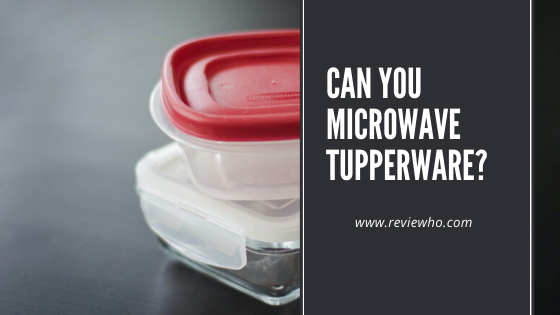Tupperware has been around for a long time, since the early 40s. For more than 50 years, Tupperware has been associated with high quality, safety, durability, and environment friendly. However, regardless of this notion, there are several confusing reports about the safety of Tupperware when heating food in an oven.
In this article, we discuss some of the dangers that might come up if you heat food in plastic. We try to answer the question, “Can you microwave Tupperware?”

Risks of Microwaving Plastics
The original information states that you risk your health if you microwave food in plastic containers. Dioxins are chemicals that are produced from several materials when subjected to heat. These materials include plastic, metal, wood, and more. Therefore, if you do not microwave your food in plastic, you do not risk contamination by dioxins.
Plastics are created using a number of organic and inorganic compounds. The substances added are often to help alter the shape or stabilize the plastic. Two substances often added to plastics include:
- Bisphenol-A – Also known as BPA. This substance is added to make hard and clear plastic material.
- Phthalates – This substance works differently because it makes plastic soft and flexible.
When these two substances find their way in the tissues of a being, they tend to replicate the hormones, which is not a good thing.
Once you wrap food in a plastic that contains either of the substances above and microwaves it, there are high chances of BPA and Phthalates leaking into the food.
Risks are that BPA can affect the endocrine system, as well as the brain, especially in children.
Once the FDA recognized the potential for these chemicals to leak in food, they put up regulations that required companies to test their plastic containers before moving them to the market. They use tests used to provide FDA with information to help determine if the products can be allowed into the market.
FDA tests will several aspects. For instance, there are tests that will determine the migration of certain substances and chemical elements at certain temperatures. For a plastic to be approved for microwave use, the FDA will determine how long the plastic might be in the microwave, the likelihood for a person to eat directly from the plastic, and the temperatures that the food might reach when heated in the microwave.
In addition, the FDA determines the elements that might migrate into food and the speed at which they do the same. Tests in labs, using lab animals, will help determine the allowable amount. If the amount is 100 to 1000 times less than the amount that can harm a lab animal, the plastic passes the test and is allowed into the market.
An approved plastic should have a notification that it is microwave safe.
The hardening element shifted from the known Bisphenol A to Bisphenol B.
Related:
- Microwave Sizes and Dimensions Guide
- How To Get Burnt Smell Out of Your Microwave
- Can You Microwave Parchment Paper
Tupperware’s Quality Assurance

Tupperware provides quality assurance for several aspects that might concern their users, as follows.
Color
Tupperware containers have different shapes and colors to cater to the customer’s specific preferences in that aspect. The colorants used in the manufacture of these products are approved and registered.
The French Positive List, circular letter no 176 is the most stringent worldwide and Tupperware meets the requirements.
Highest Quality
The products created by Tupperware have a pleasant design and a smooth finishing. The company invests greatly in the design and finishing of the products to make sure that you enjoy using the containers wherever you are. The products also become durable and you can reuse them for a long time. This reduces trash, which is very important.
Microwave Safety
All products that have the indication that they are microwavable Tupperware have a specific material meant for safe microwave use. These products follow regulations from different bodies, such as the Toxic Substances Control Act Inventory in the USA, Japan Inventory, Korean Existing Chemical List, Australia Inventory of Chemical Substances, European Inventory of Existing Chemical Substances, as well as Canada’s Domestic Substances List.
Environment Friendly
Unlike products from other companies, Tupperware products are specifically designed to make sure that they can be used for a long time. Therefore, these products do not add to the garbage that already exists. They are environment friendly.
To ensure that you trust the products, Tupperware provides a lifetime warranty for their products.
Tupperware Microwave Safety
Is Tupperware microwave safe? Tupperware has products distributed in different parts of the world. For products in Canada and America, there are labels to state that the containers are microwave safe. These products do not have any traces of BPA, as per regulations to avoid any cases of the chemical risking the lives of citizens who use the product.
Tupperware also avoids any use of PET, used in disposable soda containers, PVC, mainly found in cooking oil containers, and PS, used mostly in take-out containers.
The Tupperware products are, additionally, safe for dishwashers and freezers.
Conclusion
There are worries about the safety of families that microwave their food while in plastic containers.
However, Tupperware follows adequate regulations to make sure that users are safe when using the containers. Traces of BPA might be harmful, but Tupperware does not use them in their products.
However, it is very important to check the container for a “microwave safe” logo.
Is Tupperware microwavable? The answer is that the microwavable Tupperware has an indication of the same. However, it is better to be safe than sorry. Therefore, we recommend that use glass and ceramic containers when heating your food in a microwave.
For further reading:
- What is a Convection Microwave Oven?
- Best College Room Microwave Oven
- Can You Microwave Paper Cups, and Should You?
Feel free to share your observations with me in the comments section!
Also, if you find the information in this post to be useful, be sure to share this post with your friends on Facebook, Twitter, and Pinterest!




